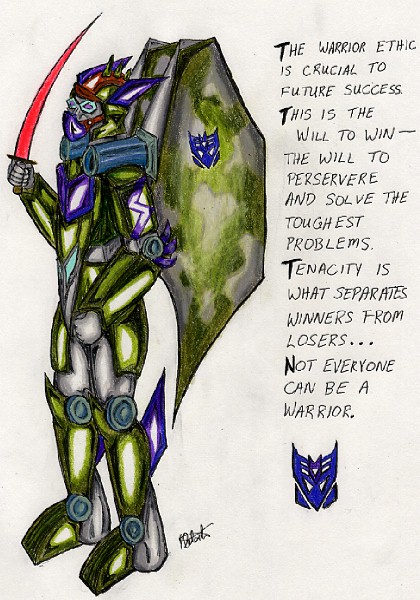I am an unapologetic nerd and I love my fandoms.
124 of my original, 1980s vintage My Little Ponies that I owned from childhood on, an encyclopedic knowledge of Transformers, an appearance on the Gargoyles Season One DVD and a dedication in a Halo novel all indicate just how much I love my fandoms.
 In undergraduate university I discovered the Internet was filled with creative fans just like me. Fans who took part in fandom and made it their own through fan fiction, fan art, fan comics, roleplaying, handicrafts, cosplay, conventions…the list goes on.
In undergraduate university I discovered the Internet was filled with creative fans just like me. Fans who took part in fandom and made it their own through fan fiction, fan art, fan comics, roleplaying, handicrafts, cosplay, conventions…the list goes on.
So, having an affinity for writing, I tried my hand at some fan fiction. I’d mostly quit doing creative writing in the last few years of high school (spending most of my free time on getting my glider and private pilot licenses) and fan fiction brought back to me just how much I loved storytelling. I met people online who read my stuff and gave me feedback: what worked, what didn’t, what they’d like to see next. I had a critique group, an audience, and a fan club all in one.
In my first year at Royal Military College I realized I wanted to be a professional writer. Somewhere down the line, I wanted to tell stories for a career. I wanted to write at a pro level, to create worlds and share my vision and earn at least part of my living doing it–to be able to focus on creating and support myself while doing so.
…but I was still writing fan fiction.
I was getting better, I told myself, and I was. Every writer has to write their million words of crap before they learn to shine, I said, and I did. I’m honing my skills at character development, outlining, foreshadowing, strong beginnings, rewarding endings, I argued, and it was true.
But I couldn’t sell any of it.
I had nothing to submit to paying markets. I had nothing to bring to a writer’s group of people polishing their work for publication. I wasn’t getting any experience at creating worlds from scratch, or working out internal logic for those worlds. I wasn’t learning how to write cover letters, network with industry professionals, or sort out good opportunities from mediocre opportunities from outright predators.
I spent hours roleplaying, convincing myself I was “improving my character building skills.” I was hooked on the kudos I received for the next posted chapter of my fanfic saga, thrilled to hear that people loved my writing. I drew my characters over and over to have models when it came time to describe them in words. I told myself I’d be hot out of the gate when my professional writing career began. But at this point, I was marking time.
Superstars Writing Seminar was a watershed for me. Investing in the seminar meant it was time to start looking at my writing as a career, not a hobby; as a job, not a celebration of my fandom. I quit fanfic writing and roleplaying and fan art and relegated myself to the occasional TV show, comic book and hour of video games.
…I went too far the other way, and was dissatisfied. I missed the social aspect of fandom, I missed playing with my beloved characters, and I felt like a huge component of my life had been cut away.
So I’ve returned to role-playing and fan fiction, but strictly as entertainment. It comes after, not before, my professional writing goals for the day have been met. It comes instead of, not in addition to, other things I might choose to do for fun, like play video games or make crafts. It might support my professional writing by introducing me to more people, picking up my mood when I feel frustrated and battered, and encouraging me to play with words, but it does not take the place of writing original stories, editing them, submitting them, and beginning research on the next.
I don’t do cosplay or make fan comics or draw art challenges any more. With limited time for relaxation, I chose fan fic and roleplaying as my favourite parts of fandom, and let the others go.
If I had it to do over, I’m tempted to say that I’d push myself to start submitting my work sooner. I’m not sure, though, how to pinpoint the time in my life where I was mature enough to not interpret a rejection as a portent of doom, personal insult, or sign of my complete and incurable ineptitude. I’m also grateful for the epic saga I wrote that taught me yes, I do have the ability to write a book’s worth of material.
So instead, I’d tell myself to keep in mind that fandom is not a career.
If you love to write fan fiction, roleplay, cosplay, draw, do voiceovers, whatever…do it! But don’t fool yourself into thinking that your marathon roleplay sessions or your fanfiction epic or your costume of your character are critical building blocks to professionally publishing your first story. Writing that story is a critical building block to publishing that story. So is editing, submitting, learning lessons, networking, and starting a second story in case the first one doesn’t pan out. By all means keep doing what you love, but know that if you want to make writing your career, you need to focus on writing sellable stories, and save your fan activities for your relaxation time.
(And if you’d like to write for licensed IPs – intellectual properties, like Halo and Transformers and My Little Pony – those writers aren’t chosen from the best fanfiction on the internet. Invitations to write for licensed IPs go to people who’ve already proven they have the professionalism to write, edit and sell original fiction. Publishing your original novel will get you there a lot faster than writing your 100th fanfic–or your 1000th.)
Even if you’re not a fan – I’ve seen aspiring writers do a similar thing with writing “prep”. They attend tons of seminars, go to cons, faithfully update their social media, and spend hours on story research and how-to-improve-your-writing books….but rarely write anything. All those things are great, but they don’t replace the fundamental act of writing. You can’t supplement what you’re not actually doing.
If you want to be a writer….write!


